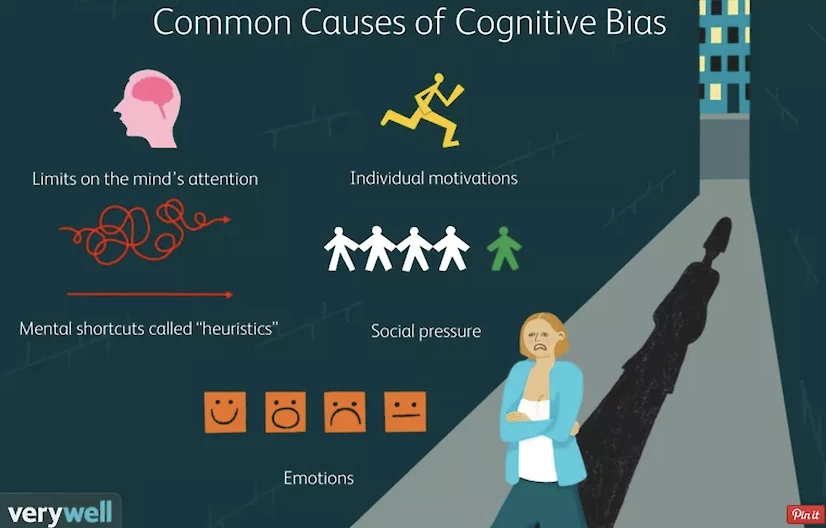

The anchoring effect & the paranormal
Psychology itself is full of 'effects'. They all demonstrate the different ways we are influenced by our brains. Whether we see things that aren't there, hear things that aren't there, or misinterpret information right through to how we behave can all be tied back to one of these 'effects'. While you may think they seem irrelevant, they can be beneficial tools when it comes to investigating the paranormal. While a lot of people complain about electronic equipment not being reliable during an investigation, the same thing could be said about our brains. Knowledge is power and just knowing about these things makes us more aware and in turn, makes us better paranormal investigators. An experience could be so much more significant when we can in fact rule out all the little things that trick us into thinking something is happening and we can truly start asking questions.
What is the anchoring effect?
The anchoring effect is also known as anchoring bias or focalism. It is a form of cognitive bias that affects the way we behave. A cognitive bias is an error in the way that we think. When we process the information around us, we usually do so with our own belief systems and experiences. Our brain is trying to make us see things in a way that seems familiar to us but it needs to do so very quickly because we need to make a decision. Our memory for example can be quite unreliable. We may remember a past event very differently which can cause us to make a decision based on an experience that we had. Time may have distorted the way we remember the experience and a very small incident can become quite the story as time goes on. Our decision-making is based on what we remember and not what really happened which in a lot of cases can be quite different.
Quite a few different things fall under this umbrella such as confirmation bias. This is something I have explored in detail in my book Stuff Paranormal Investigators Need To Know. One form of cognitive bias is where we look for patterns or things that 'fit' with what we believe. . For example, just us believing that a spirit exists means that when we are out on an investigation looking for one, our brain is looking for ways to tell us a spirit is there. It is why people will commonly think a sound like a door closing is a spirit rather than the wind. Our brain jumps to this conclusion because it is what we are looking for. Maybe socially we feel like we are pressured to behave a certain way. When you join the paranormal field, for example, a person may act more spiritual than they really are or pretend to be more skeptical while having private beliefs because they want to fit in with the people around them. If a person is told so many times that a spirit makes a cold spot for example, once you hear that phrase enough, every time you walk into a cold spot your brain's first reaction is automatically going to tell you a spirit is behind it.
The anchoring effect is another form of a cognitive bias that is usually referred to in finance and specifically in retail. For example, a new pair of jeans may be priced at $200. If the store is having a sale of 20% off, you feel you are getting a really good bargain because your initial reference point is $200. The jeans themselves may not even be worth that much but your brain is telling you that you are getting a really good deal and you will likely impulse buy because you think you are getting a good deal. The reality of the situation is that the jeans cost the retailer around $20 to make and they are likely making a mark-up of around 75% so they are worth much less. It doesn't matter because your brain has been told otherwise. The anchoring effect is essentially a reference point that your brain will always go back to. Say when you were a child and your parents made you go to bed at 8:30, you are likely to put your own kids to bed at 8:30 because that is your reference point. When it comes to the paranormal, if we were taught from a young age that a spirit is x, we are going to grow up investigating the paranormal based on our belief that a ghost is x because that is our reference point. If we are scared to tell people publicly that we are 'ghost hunters' it is because in the past we have seen people judged. Us seeing the paranormal as a taboo when we were younger is our reference point. Of course, we are not tethered to an anchor but it is important to understand that it is a fundamental part of our decision-making process. Applying critical thinking to our decision-making process can often help overcome these bias'. Critical thinking is something that is important when approaching a paranormal investigation.

Image source: https://www.verywellmind.com/what-is-a-cognitive-bias-2794963
How does this affect us during a paranormal investigation?
The first thing to look at it would be how in fact you are planning to do your investigation. You are likely doing an investigation based on a claim or a witness testimony. In order for this to happen, you are given a piece of information. This information immediately becomes your reference point or your anchoring. It is what you are always going to refer back to. You are likely going to investigate the areas where activity is said to occur. It means you may not be giving enough attention to other areas of the property because your brain is telling you that this is the area you must be in because that is where someone else has experienced something. If someone tells you that they had good REM pod activity in this room, you are automatically going to reach for the REM pod because again your brain is telling you the same thing will happen. Now, this isn't necessarily a bad thing in these kinds of scenarios because it is important for us as investigators to validate claims. The problem is however, that we are setting ourselves expectations. Expectation alters our perception. If we are too focused on waiting for this REM pod to go off because that is what we are expecting, are we missing out on something else? The question becomes, are we setting ourselves up to fail?
Paranormal phenomena are spontaneous and we cannot predict where, when, or how it is going to happen. This is why we are investigating in the first place isn't it, to find out some sort of answer to this? Are we limiting ourselves by focusing our attention on certain areas or by certain pieces of equipment? We may use EVP for example because the past may tell us that we result with this method. Does this mean we are playing it too safe and not thinking outside the box? Is this safety stopping us from moving forward? Are we limiting ourselves to only going to certain locations? Sensitive people will tell us that you don't need to go to a haunted location to experience the paranormal so are we limiting ourselves by only looking for it at supposedly haunted buildings? Should we only be looking at places with stories attached or taking it further? There are a lot of what-ifs and should or could that we can ponder here. Does our anchoring hold us back?
Are we setting ourselves up for disappointment? When you have what you believe to be a paranormal experience, for example, it is going to be your reference point or your anchor for all future experiences. Whether you are aware of it or not, you are going to compare any new experiences back to this initial experience. This initial experience may have happened earlier on when you were less experienced. Our memory may make it more epic and significant as time goes on and it is built up to be much bigger and better than it really was. It is likely that our more recent experiences will not compare. Does this mean that we are potentially writing off other experiences or evidence because it wasn't as significant as our anchoring? Perhaps it isn't the really big things that we remember that we should be focusing on. Maybe there is something to all the little small things but we are potentially overlooking them because we are unknowingly looking for our anchor.
Anchoring affects our everyday decision-making process so it is inevitable that it will also affect the way we investigate the paranormal. Cognitive bias' is one of the biggest downfalls of paranormal investigators. In fact, our own bias will tell us that we are not even biased. It is not something that people who believe in the paranormal are subject to. Skeptical people are as well. In the same way, a person that is looking for evidence of the paranormal may try to put together the pieces to fit their idea of something being paranormal, a skeptical person will put the pieces together to fit their idea that it isn't. We will never be entirely free of our own biases, but adopting a critical thinking process is a good start. Even just being aware that bias exists is the first step. This is why discussion is imperative. Discuss findings with your peers. Investigate with others and see their styles. While you may all have your own bias, by working together you are embracing new ideas, new techniques, and new perspectives. This perspective just may allow you to see enough of the real picture to understand what is going on - it may be a lot different from what your brain is telling you it will be!
References
https://www.pon.harvard.edu/daily/negotiation-skills-daily/the-drawbacks-of-goals/
https://www.verywellmind.com/what-is-the-anchoring-bias-2795029
https://www.simplypsychology.org/cognitive-bias.html
If you enjoy LLIFS, consider buying me a book (otherwise known as buy me a coffee but I don't drink coffee and I LOVE books). Your donation helps to fund the LLIFS website so everyone can continue to access great paranormal content and resources for FREE!

Top pages with similar subjects
Don't forget to follow the Facebook page for regular updates
Join the mailing list to receive weekly updates of NEW articles. Never miss an article again!
Buy the latest and past issues Haunted Magazine
Check out the books written by LLIFS
Comments
-
Kd Foreman 4 years ago
This is also referred to a the 'Bob Theory'. Tell an investigator that Bob died here, and the investigator will only focus on Bob. This is why I prefer going in cold!
-
Llifs 4 years ago
Oh yes there is always a ‘Bob’!
-